
|
My Father, World War II |
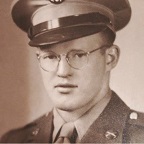 |
| POW Donald Leroy Plants |
[Editor's note: the author is the son of the late Rev. Donald Leroy and Jeanette (Caldwell) Plants of Rome, GA and grandson of the late John and Ollie Margaret (Miner) Plants of Ashbatula, Ohio. Donald was one of the guest speakers at the 1998 Minerd-Miner Reunion held at Kingwood, PA.]
My Dad was a member of the Big Red One. He served in three campaigns: North Africa, Sicily and the European Theatre including the D-Day invasion and the Battle of the Bulge.
Dad had three jobs: a baker, demolitions engineer and a scout. During a lull some of the brass was visiting. None other than the Allied Supreme Commander Dwight David Eisenhower asked to meet the GI who made the delicious rolls.
My Dad was one of two scouts in his unit. On patrol, the German forces would allow the scouts to pass by and would open fire on the main body of GIs. The two scouts who carried the BAR (Browning Automatic Rifle), would turn and open fire. With the BAR it was like have ten men, effectively surrounding the German troops.
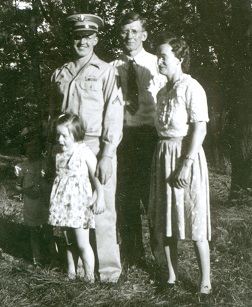 |
| At home with his parents and cousin Patty Schultz |
One day my Dad’s commanding officer ordered the scouts to go on a recon-mission saying, ”We know there are not any Germans over that hill, but want you to see what they are doing.” That was when my Dad, fellow scout and others were captured. It was near the end of the Battle of the Bulge. Due to the advanced technology of the BAR, upon realizing capture was about to take place, they broke the weapons down and begin to sling parts in as many directions as possible. This was done to prevent the Germans from copying the BAR. My Dad said to his fellow scout, “we are wasting a lot of money.”
This episode became a reoccurring nightmare after he married my Mom.
He and fellow POWs were transported to the POW camps in Germany via rail cars [box/cattle cars]. The train came under fire from a couple of our fighter planes. The men manage to break the lock on the cars, ran into a near by field, laid on the ground and formed the letters ‘POW’. The pilots stopped firing and rocked the wings. Once back on the trip to the POW camps, the planes followed the train to the German border warning off any other American planes.
Once in the camp they found out my Dad had also been a cook, making pies and rolls. After taking his watch, they took his combat boots and gave him wooden shoes (as in Holland), and send him to the kitchen.
The Allies had an effective blockade of Germany; so effective they were running out of food supplies. They gave ten POWs a loaf of bread the size of your two fists along with just over a pint of water. This was the daily ration for the ten men to share. The bread was so hard they would throw it against the wall to break it into small enough pieces to eat. Remember Dad the baker. Initially, he did not eat the bread for it consisted of one-third flour, one-third sawdust, and one-third chicken manure. Later he got hungry enough to consume the bread. He lost 100 lbs. as a POW during the three months in confinement.
One day while repairing bomb craters in the roads, the POWs came upon a German helmet. They built a fire and made grass soup in the helmet. They said that was the best food the entire time in captivity.
The German soldiers would march the POWs throughout the countryside. They attempted to show that many more POWs were captured than actually were captured. The POWs were marched 4 abreast through the same towns and villages over and over again. During these marches my Dad would always be on the outside left of the formation. As they went through each town, farmers would hit the POWS with the backside of a shovel. This resulted in my Dad needing ball and socket shoulder replacement many years later.
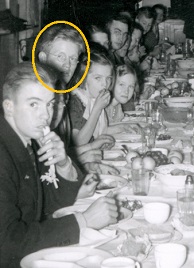 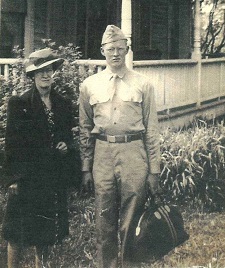 |
Left: Donald (circled) at the Sept. 1941 Miner Reunion at Washington (PA) Park, on the eve of World War II. Right: with his mother in the fall of 1944, months before his capture and imprisonment. Within two years she was dead. |
My Dad escaped twice. The first time he and four others were weaving in and out of pine trees to avoid being shot. These trees were planted like we do for the pulpwood industry. Later after dark they tried stealing a farmer’s chickens. The farmer “encouraged” them back to the POW camp using his double-barreled shotgun.
The second time he escaped alone. While evading the German patrols looking for him, he came upon a train trestle just after a tunnel. Setting there just yards from the tunnel was an ammo shack. He broke the lock; removed the charges; set them and blew the trestle as he was train to do. This was like saying, “Here I Am” to his pursuers. Germans with their police dogs came after him. He took off running up and down hills to escape the dogs. Going down a hill he stepped on the trunk of a small bush and fell to the ground. Looking back, he noticed the ground had a concave depression under the bush, so he crawled into the depression. Dogs and
soldiers came jumping over him and never realized he was there. The bush was similar to our honeysuckle here in the Great USofA; the blooms completely masked his odor.
He met up with another POW from his camp and they made their way to the American lines finding a tank unit. It took a lot of convincing, but the commander agreed to check out the area of the camp with a condition. My Dad and his POW pal would rid out in the open atop the lead tank. The commander said, “If this is a trap, you two will get a bullet to the back of your heads.” The few (>50) German guards heard the tanks coming; recognized they were American tanks; and ran off leaving some 3000 Canadian, British and American POWs to be rescued.
He returned to the United States on the QE2.
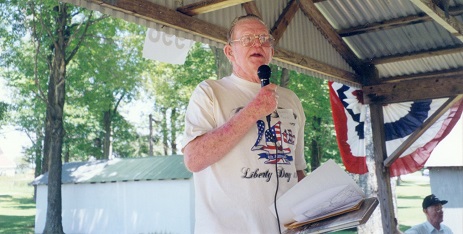 |
Donald speaking at our 1998 reunion, one of the first times he publicly opened up about his prisoner of war experiences |
~ Memories From Rev. Plants' Son Marshall ~
I have very little to add, having heard these stories only briefly. My dad did not talk much about his military experience. One antidote he shared concerned his personal belongings. In the camp, all of his personal belonging were taken away, including his watch and his combat boots. He was given wooden shoes to wear while he worked. He refused to give up his high school class ring. A POW guard was going to chop his finger off to get it. My dad remained motionless as the guard raised the hatchet, at which point the guard laid the hatchet down and said, “Soldier, you’re just too damn brave.” Poppy kept his ring and his finger.
I can add that he was held in Stalag XII-A. This was confirmed by a letter I received in 2017. The letter came from Amsterdam, Netherlands and was signed by Isabel van Boetzelaer. She states that her father was Dutch and her mother was German, but she considers herself to be Dutch. She was writing a book about her parents and grandparents.
She stated that her grandfather had been commander of Stalag XIIa from October 7, 1942 until January 19, 1945. His name was Oberst Hilmar Baron von der Recke and that the POW camp was in Limburg An Der Lahn, Hessen-Nassau, Preuβen.
~ Memories From Rev. Plants' Niece Jacqueline Alkula ~
From what I was told about Uncle Don ("Pete"), he was part of Operation Torch - the invasion of North Africa; the was part of the invasion of Sicily; and was in the second wave at Normandy - D-Day 1944. We also learned at a very young age not to ask what he did or saw during the war... as well as to listen when he did speak of this part of his life.
In 1980 while I was in Florida getting custody of the boys, he stopped in to visit. He told me the story of lading at Normandy - they were trapped on the dunes and the Germans had machine guns blasting away. Uncle Pete was as Combat Engineer - he and another soldier of his unit took a number of TNT sticks and taped them to a lid of an ammo crate. Then the infantry all started shooting at the German bunkers - the machine guns would stop shooting and then closed the shutter to the bunker - Uncle Pete and the other soldier crawled under the "covering fire" until they got up against the concrete of the bunker.
With a signal to our soldiers they all stopped shooting, reloading their weapons. The Germans would then open the shutters and start shooting again. At this point either Uncle Don or the other soldier pulled the primer and they shoved this lid of TNT into the bunker. Then our solider would start shooting - someone inside closed the shutter - then BOOM - one bunker out of action.
I did ask if they taught them how to do this in Basic Training ---- he grinned and said "Nope."
Copyright © 2019 Donald E. Plants. Published with permission.